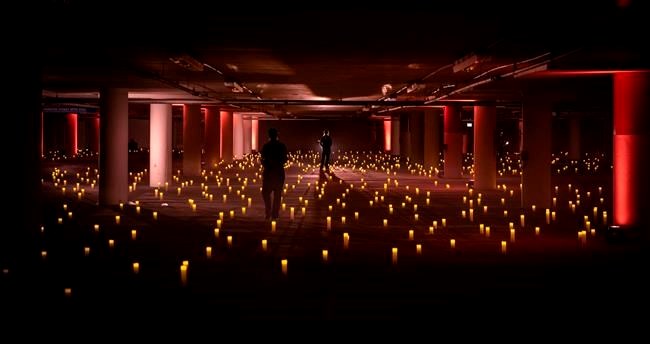CHICAGO ŌĆö Amid signs pointing ŌĆ£To ElevatorŌĆØ and advising drivers to ŌĆ£Take Parking Ticket With You,ŌĆØ the Rhinemaidens lament the theft of their gold, Siegfried is murdered, and Br├╝nnhilde drives off in a red Mustang convertible to redeem the world.
Welcome to opera in an underground parking garage.
A year after Lyric OperaŌĆÖs production of Richard WagnerŌĆÖs complete ŌĆ£RingŌĆØ cycle was scuttled by the pandemic, the company has brought a bit of the epic back to life. But instead of walking into the opera house and taking their seats, spectators drive down into the garage and stay in their cars.
ŌĆ£Twilight: Gods,ŌĆØ as the production is called, is the brainchild of Yuval Sharon, who premiered it last November in Detroit, where he had just been named artistic director of Michigan Opera Theater.
ItŌĆÖs a reimagining of ŌĆ£G├Čtterd├żmmerung,ŌĆØ the final installment in WagnerŌĆÖs four-part saga of gold, greed and the downfall of the gods. Using his own English translation, Sharon has distilled the four-hour-plus opera down to six episodes lasting just over an hour all together.
ŌĆ£He came to me with this amazing, wonderful, crazy idea,ŌĆØ said Anthony Freund, LyricŌĆÖs general director. ŌĆ£The cancellation of our ŌĆśRingŌĆÖ ŌĆ” certainly made it seem particularly appropriate. ThereŌĆÖs great excitement around it.ŌĆØ
So much so that all three performances, April 28-May 2, sold out almost immediately, as had all the Detroit shows. Still, the total audience for ŌĆ£Twilight: GodsŌĆØ will be a fraction of the number who could watch a single performance in the Lyric Opera House, which has a seating capacity of 3,276.
But for now, the house remains closed to live opera, as do other major houses in the U.S., including New YorkŌĆÖs Metropolitan Opera. Many companies have instead reached out to audiences by streaming new content and videos of past performances or presenting opera in outdoor venues.
For ŌĆ£Twilight: Gods,ŌĆØ nine cars at a time, each paying an entry fee of $125, enter the Millennium Lakeside Parking Garage, a 13-acre underground structure near the shore of Lake Michigan. Spectators watch the action through their windshields and listen to the music on their car radios.
When the first group of cars has finished a scene, they drive to the next location ŌĆö the speed limit is 3 mph ŌĆö and another nine enter. This continues until 14 groups of cars have cycled through the whole show, requiring the singers to perform their scenes 14 times each day.
In Detroit, Sharon used the companyŌĆÖs own parking structure, which is above ground and allowed scenes to be played on ascending levels open to the air at the sides. By contrast, in Chicago the action all takes place on the same subterranean level.
ŌĆ£ItŌĆÖs likely to have a much more labyrinthian feeling, a sense of being kind of lost in the space,ŌĆØ Sharon said. ŌĆ£ItŌĆÖs very appropriate for where we are now as a society, as we feel our way to where we are going next.ŌĆØ
And, indeed, at MondayŌĆÖs dress rehearsal, winding in the dark through vast stretches of empty parking spaces from scene to scene created a disorienting sensation. This feeling was heightened after SiegfriedŌĆÖs death when the procession of cars was directed to snake through a section where 2,880 battery-powered candles burned on the floor, while his funeral march played in an arrangement for jazz combo.
The cast is largely the same as in Detroit, headlined by soprano Christine Goerke as Br├╝nnhilde ŌĆö the role she was to have sung in LyricŌĆÖs full production ŌĆö and tenor Sean Panikkar as Siegfried. One key difference is the narrator who connects the segments.
In Detroit, Marsha Music, a local Black writer and cultural historian, portrayed Erda, the mother of the universe, who appears in two earlier ŌĆ£RingŌĆØ operas. For Chicago, Sharon chose avery r. young, a Chicago-born Black poet, composer and activist. He portrays all three of the Norns, the daughters of Erda who foretell destiny.
Young said Sharon ŌĆ£asked me to put a modern-day spin on the work, to tell the story the way a Chicagoan who grew up where I did would tell it.ŌĆØ
ŌĆ£A lot of the themes are aligned to things we see today in this political climate,ŌĆØ young said. ŌĆ£Who in this current America is given value and who is still protesting and advocating that they should be valued.ŌĆØ
In his version, Br├╝nnhildeŌĆÖs rock becomes a ŌĆ£stony island,ŌĆØ a reference to Stony Island Avenue, the thoroughfare that runs the length of ChicagoŌĆÖs predominantly Black South Side.
And youngŌĆÖs narration includes images of police brutality and the murders of black men, as in this passage about lynching: ŌĆ£like him know rope/ like him know tree/ like him know how much of dead/ make a bough break.ŌĆØ
Because a full orchestra was out of the question, Sharon had composer Ed Windels adapt the score for an unusual assortment of instruments, including an accordion in one scene and a marimba in another.
Freund said that once the pandemic is past, the company remains committed to presenting its full ŌĆ£RingŌĆØ in a future season. Meanwhile, a film of the Chicago ŌĆ£Twilight: GodsŌĆØ will be released this summer and available for streaming free of charge.
Mike Silverman, The Associated Press




